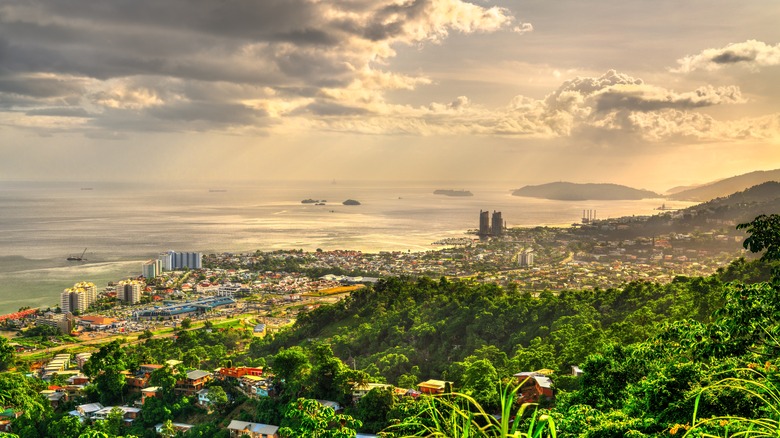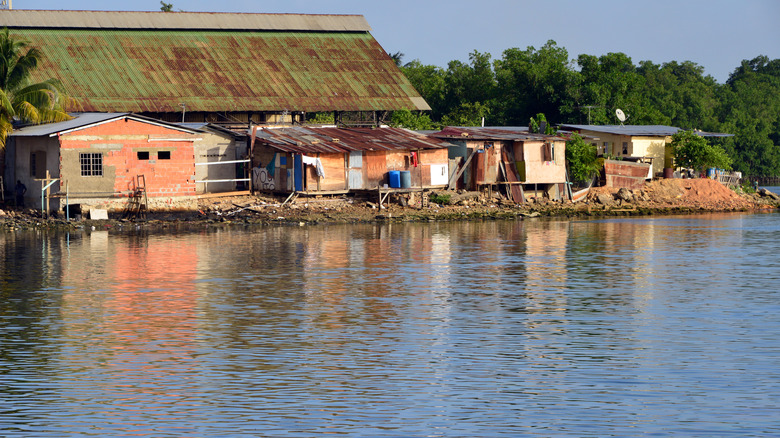Why Tourists Should Avoid This Beautiful Caribbean Island Capital On Their Next West Indies Vacation
Port of Spain is the vibrant capital of Trinidad and Tobago, a stunning island that is perfect for experiencing Caribbean culture. Located in northwest Trinidad, the city is known for its lively steel pan music, colonial architecture, and world-famous Carnival festival. During the day, there are several attractions in the downtown area that are worth visiting. Near the Queen's Park Savannah and the Botanical Gardens, which are worthy stops themselves, you'll find the National Museum and Art Gallery. This museum is a great introduction to the culture and history of the area. Not only are most exhibits free to enter, but the museum also showcases artwork from local artists and gives insight into the island's colonial past and independence.
However, despite having so much to offer, Trinidad and Tobago is considered one of the most dangerous Caribbean destinations, according to research. And Port of Spain, in particular, contains several of the main spots to avoid in Trinidad and Tobago, especially during the night. In recent years, rising crime rates have led the U.S. Department of State's Bureau of Consular Affairs to issue a travel advisory warning, urging travelers to reconsider visiting the region. Due to the prevalence of violence in certain neighborhoods, it's essential to know which places to steer clear of altogether, as well as tips on how to visit the city safely if you add it to your West Indies itinerary.
What to know about the travel advisory for Port of Spain
It's crucial to understand what a travel advisory means. The U.S. State Department rates every country based on a 4-tier system. Level 1 says to exercise normal precautions when traveling, while Level 4 is the highest advisory level, where the government strongly advises you to leave the country immediately or not to travel there due to life-threatening risks.
As of May 7th, 2025, the U.S. Department of State issued Trinidad and Tobago a Level 3 advisory due to a heightened risk of crime, terrorism, and kidnapping. U.S. government workers are forbidden to enter certain areas in Port of Spain, including Laventille, Beetham, Sea Lots, Cocorite, Besson Street, Piccadilly Street, and part of Charlotte Street at any time. After dark, the downtown area, all of the beaches, and the Fort George overlook are also off-limits. Non-essential travel here is strongly discouraged because of how common crimes like murder, robbery, and assault are.
This advisory doesn't stop Americans or other nationalities from visiting, but it highlights the importance of being aware when traveling. For example, in 2024, the Trinidad and Tobago Police Service reported 623 murders, or about 37 per 100,000 people, making the nation the sixth most dangerous worldwide, according to a report from the Overseas Security Advisory Council. It's also important to note that since a Level 3 advisory for this destination is already in place, most travel insurance policies will exclude terrorism and political evacuation coverage, and some won't cover trip cancellation. Currently, Trinidad and Tobago is classified as a "medium-threat" location for terrorism by the U.S. Department of State.
Exploring Port of Spain safely
Traveling always comes with some risks, no matter where you go. However, in Port of Spain, where certain types of crime are especially common, there are steps you can take to stay safe and lower your chances of becoming a victim of a crime. One way is to avoid walking the streets late, especially in the downtown area and on the beaches. Always stay aware of your surroundings, even during the daytime, and especially during crowded events like Carnival or other festivals. Read up on travel expert Rick Steves' tips to not get pickpocketed and don't withdraw large amounts from ATMs, especially since ATM card skimming scams are common here. Instead, it's better to do an electronic transfer or cash a check.
Since robberies are common as well, don't wear flashy jewelry, wear designer clothing, or carry around cash. Consider leaving all valuables in your hotel safe or at home. It is also advised not to use public transportation. Instead, use metered taxis, especially for nighttime trips back to your hotel. If you do rent a car or use a taxi, make sure the windows are up at all times, since theft from unlocked doors or unsecured windows is also a common tactic.
In 2024, kidnappings almost doubled in Trinidad and Tobago, with some incidents involving the use of drug-facilitated assault. So it's important to remain vigilant of your surroundings and not accept drinks or food from strangers. For an extra level of protection, enroll in the helpful, free, and overlooked program that can help keep you safe while traveling abroad: the State Department's Smart Traveler Enrollment Program, or STEP. For Americans, you can sign up to receive security and safety alerts from the U.S. embassy or consulate when visiting the country.


